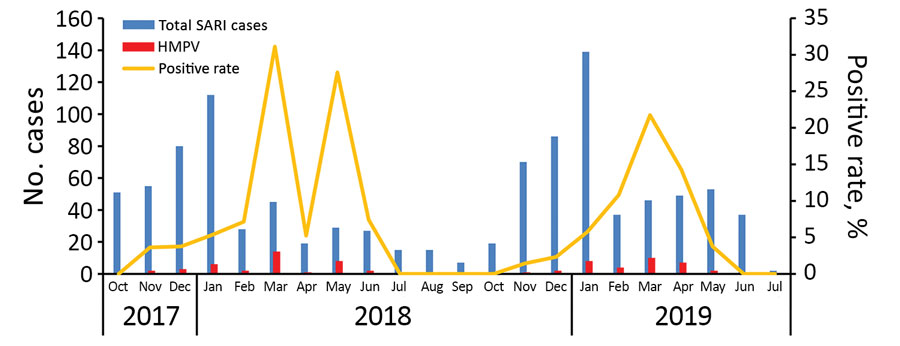


Amidst growing concerns over the coronavirus outbreak, China confirms an increase in cases of human metapneumovirus (HMPV) among children under 14 years old, especially in northern provinces. HMPV is a respiratory illness similar to the common cold, with symptoms including coughing, runny nose, and sore throat. Health officials are urging the public not to blindly use antiviral drugs to fight HMPV, as there is currently no vaccine against the virus. Antibiotics may be prescribed in extreme cases where HMPV has caused pneumonia and a secondary bacterial infection.
Human Metapneumovirus (HMPV): A Growing Concern
Background
Human metapneumovirus (HMPV) is a common respiratory virus that causes infections in children and adults. It is spread through direct contact with respiratory secretions or objects contaminated with the virus. Symptoms of HMPV include coughing, runny nose, sore throat, fever, and wheezing.
Current Situation
In January 2023, China reported an increase in HMPV cases among children under 14 years old, particularly in northern provinces. This has raised concerns about the potential for a widespread outbreak.
FAQs
1. What are the symptoms of HMPV?
Symptoms include coughing, runny nose, sore throat, fever, and wheezing. In severe cases, it can lead to pneumonia or bronchiolitis.
2. How is HMPV spread?
HMPV is spread through direct contact with respiratory secretions or contaminated objects. This can occur through coughing, sneezing, or sharing toys.
3. Is there a vaccine for HMPV?
Currently, there is no vaccine available for HMPV.
4. How is HMPV treated?
Most HMPV infections are mild and can be treated with supportive care, such as rest, fluids, and over-the-counter medications. In severe cases, hospitalization and antiviral medications may be necessary.
5. What are the long-term effects of HMPV?
Most HMPV infections do not cause long-term effects. However, in some cases, it can lead to asthma or other respiratory conditions.
Historical Context
HMPV was first identified in 2001. It has since been recognized as a common cause of respiratory infections, particularly among young children. In 2011, an outbreak of HMPV in Australia resulted in widespread hospitalizations.
Prevention
There is no specific vaccine for HMPV. However, there are steps that can be taken to prevent infection, including:

Every year, India celebrates the birth anniversary of the renowned physicist CV Raman, who is known for his groundbreaking work on light scattering and the Raman Effect. Despite receiving numerous offers to work in Western labs after winning the Nobel Prize in Physics, Raman remained committed to his belief in fostering a strong scientific culture in India and mentoring future scientists. His discovery of the Raman Effect continues to be relevant and widely used in various fields today, serving as a testament to the quantum nature of light and the energy levels in molecules.

As meditation gains popularity as a mental well-being tool, concerns about potential side effects have emerged. A recent study by a team of researchers from the University of Melbourne delved into the prevalence of adverse experiences among meditators in the United States. By recruiting nearly 900 adults from various meditation skill levels, the study aimed to provide more accurate estimates of how common these side effects are and what factors may contribute to experiencing them. The findings highlight the need for clearer reporting standards in future research on meditation.

Prime Minister Narendra Modi launched a groundbreaking research, development and innovation scheme that will provide a boost to the flourishing ecosystem of innovation in India. In his address at the Emerging Science, Technology and Innovation Conclave, PM Modi highlighted the crucial role of science and technology in driving transformation and emphasized on India's significant progress in the field. He also acknowledged the remarkable achievement of India's women's cricket team and expressed confidence that their success would inspire the country's youth. Attendees included renowned scientists, innovators, and distinguished guests from both India and abroad.

Indian Prime Minister Narendra Modi inaugurated the Emerging Science and Technology Innovation Conclave (ESTIC) 2025 and launched the Rs 1 lakh crore Research Development and Innovation (RDI) Scheme Fund. The scheme aims to strengthen the private sector-driven research and innovation ecosystem in the country and has a total outlay of Rs 1 lakh crore over 6 years. ESTIC 2025, gathering over 3,000 participants, focuses on 11 critical thematic areas including Artificial Intelligence, Quantum Science and Technology, and Space Technologies, providing opportunities for collaboration and reinforcing India’s science and technology ecosystem.

In this edition of Health360, a renewed debate over the alleged link between vaccines and autism is sparked by tech mogul Sridhar Vembu's endorsement of a questionable study. Despite reassurances from the medical community backed by data from the WHO, doubts continue to persist, leading to potential harm to public health. The program also delves into the alarming rise in back pain cases in India and explores new treatments.

In an effort to fight the ongoing air pollution crisis, Delhi conducted its first-ever official cloud seeding operation led by IIT Kanpur. The operation involved a small aircraft dispersing specially designed chemical flares into the atmosphere to create rain. While experts say rainfall could occur within 15 minutes to 4 hours, the actual timeframe depends on various factors such as wind direction and moisture content. If successful, the government plans to continue the operation in the coming days.

In the quest for stronger, luscious hair, we often overlook the importance of nurturing the roots. Fortunately, Ayurveda has long stressed the significance of this practice, which has now been backed by modern science. Studies have shown that herbs like Bhringraj and Amla can activate hair follicles, promoting new growth and delaying greying. Fenugreek, Neem, Hibiscus, and Ashwagandha are also found to be beneficial in strengthening and nourishing the scalp, resulting in thicker and healthier hair.

A college student shares her personal journey of becoming a vegetarian, despite facing challenges and health concerns. She then delves into an ethics class she took, where the concept of marginal cases were discussed. Following an article by philosophy professor Alastair Norcross, she concludes that even though individual action may seem insignificant, refusing to consume factory-farmed meat holds moral significance due to the potential to prevent immense suffering for animals.

On October 24, the global community commemorates World Polio Day to honor the legacy of Dr. Jonas Salk and the efforts of countless individuals and organizations in the fight against polio. This highly contagious and potentially deadly disease, once a widespread epidemic, is now largely preventable thanks to the development of a life-saving vaccine. India's successful eradication of polio serves as a testament to the importance of strong vaccination programs and collaborations in public health initiatives.

As winter arrives in India, so does the hazardous air pollution. Delhi NCR's AQI has already crossed the 400 mark, making it crucial to invest in air purifiers, especially after Diwali. Dyson, Qubo, HomePure, and Philips have launched high-quality air purifiers with advanced features to tackle different types of pollutants and create cleaner indoor air. With prices ranging from Rs 5,000 to Rs 1 lakh, these purifiers are a practical and timely purchase for a healthier living.